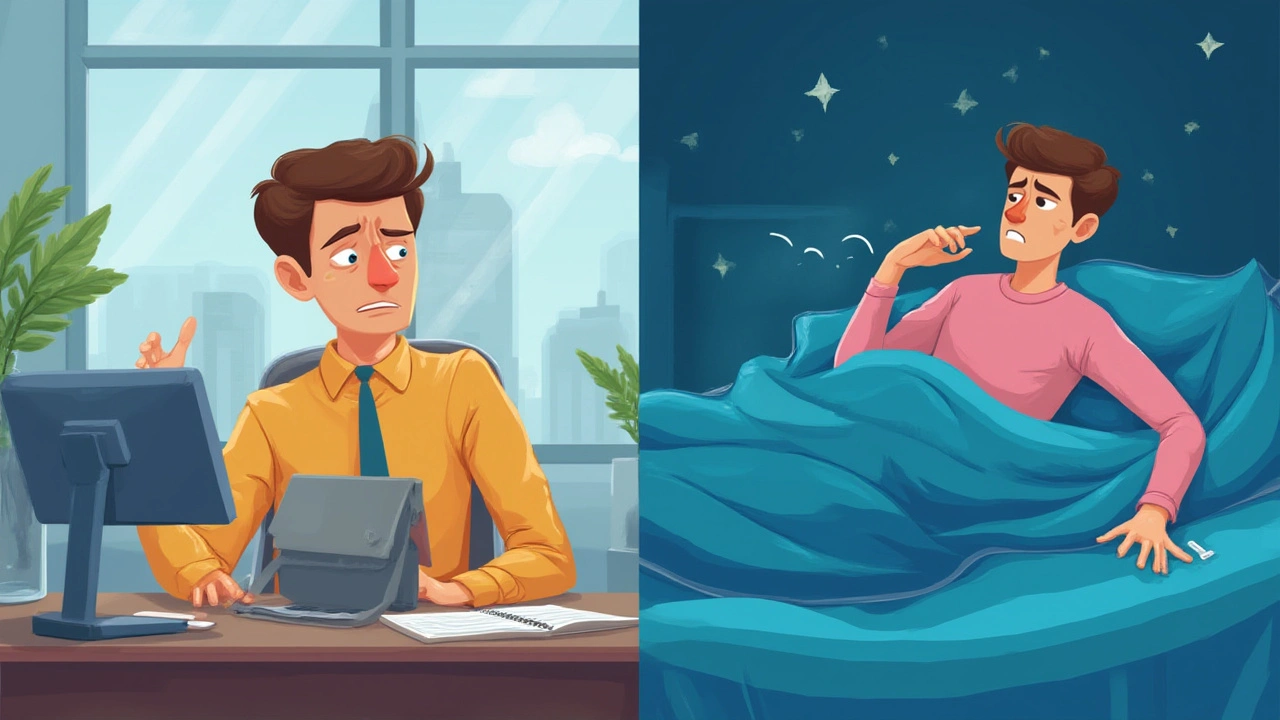Restless Leg Syndrome: How It Impacts Mental Health and Daily Life

Imagine lying in bed, your legs tingling with a prickly, nagging urge to move. No matter how tired you are, your mind can't shut off, and sleep stays just out of reach. That’s what people with restless leg syndrome (RLS) deal with. It’s more than an annoying sleep wrecker—it follows you all day, sneaks into your mood, and has a sneaky grip on your mental health.
What Exactly Is Restless Leg Syndrome?
Restless leg syndrome makes your legs twitch, crawl, or ache, usually at night or when you’ve finally sat down to relax. It’s not just fidgeting, either. It’s an uncomfortable feeling in your legs, sometimes your arms, that only moving around seems to relieve. The kicker? This relief doesn’t last. Not everyone with RLS gets these sensations the same way. For some, it’s a mild irritation, a bit like soda bubbles fizzing under your skin. For others, it’s sharp, shooting pain that drives them out of bed. RLS affects about 1 in 10 people in the UK, but it’s easy to go undiagnosed because so many shrug it off as stress or poor circulation.
Doctors haven’t pinned down the exact cause. There is a genetic link—if your mum or dad had it, you’ve got a higher chance. RLS is also more common in women, especially during pregnancy or menopause. Another group that gets it more often? People with iron deficiency or kidney problems. What’s weird is that a lot of people don’t even realise they have RLS. They just know they’re exhausted all the time. The sensations usually peak at night, so the timing makes sleep a real challenge.
RLS isn’t just an old person’s problem. Kids get it, too. And sadly, it’s not something you can just sleep off. It messes with your routine, your relationships, and even simple pleasure like watching TV. Think of the last time you had a cramp and had to get up and walk it off. Now imagine that happening, night after night. This makes RLS one of the most frustrating sleep disorders out there.
So, what does this have to do with your mental health? A lot, actually.
The Link Between RLS and Mental Health Struggles
If you thought RLS was just a sleep issue, think again. There’s a solid connection between restless leg syndrome and mental health struggles, especially anxiety and depression. Research, like the 2016 study from Johns Hopkins, shows people with RLS have about double the risk of developing depression compared to those without it. Why? The answer isn’t as simple as a lack of sleep, but that’s a big part of it.
Chronic sleep deprivation messes with almost every part of your brain. When you can’t get quality rest, you get cranky, anxious, and your coping skills tank. For anyone with RLS, it’s like a never-ending cycle: the less you sleep, the worse you feel mentally; the worse your mental health, the more severe your RLS symptoms can become. On top of that, some folks with RLS report panic attacks or a sense of dread as night falls, simply because they know what’s coming—a solid night of leg misery.
But the relationship goes both ways. Stress ramps up during the day—at work, with family, financially— and that tension can actually make RLS symptoms worse. You can end up in an exhausting feedback loop, where anxiety and depression flare up because your sleep is rubbish and then make the RLS even nastier.
Some experts suggest dopamine, that brain chemical that makes you feel motivation and joy, is low in people with RLS. Dopamine is also connected to mood disorders like depression and anxiety. No wonder the two seem to go hand in hand.
And it’s not just mood swings. RLS can lead to problems focusing, memory issues, and generally feeling burned out. You might start to cancel plans or avoid social activities because you’re either too knackered or don’t fancy twitching through dinner with friends. This isolation fuels more feelings of sadness and stress.
So next time someone shrugs off their chronic tiredness as “just RLS”, remember it can be a gateway to a much rougher mental health ride.

Everyday Life with RLS: The Invisible Burden
Living with restless leg syndrome isn’t only about what happens at night—it seeps into every bit of your day. People with RLS often have days that start groggy and foggy, with an energy level that feels like it’s been drained before getting out of bed. If you work a job that means sitting for long stretches, commuting, or standing in queues, RLS can make these everyday annoyances unbearable.
What’s tricky is that RLS doesn’t announce itself. Friends at the pub can’t see the creeping urge in your legs. Colleagues might not get why you’re constantly up and down or look shattered by lunchtime. This invisible struggle leads to a lot of guilt and frustration—no one likes being the ‘flaky’ one who cancels plans or dozes off at their desk.
The toll on relationships can sneak up too. Couples, families, and housemates have to adjust to a sleep schedule that’s all over the place. Partners complain about fidgeting in bed, while the person with RLS lies awake, feeling guilty for keeping everyone else up. More than a few marriages take a hit due to chronic sleep disruption—something you’d never link to restless legs.
Some people develop tricks, like pacing the living room at odd hours, stretching endlessly, or even applying cold packs to numb the feeling. But these are just quick fixes, not cures. What makes it scarier is that a lack of long, restful sleep sets you up for other health issues, like high blood pressure, immune problems, and wonky blood sugar levels.
Kiddos with RLS don’t have it any easier: teachers might label them as troublemakers because they can’t sit still, and parents worry when their child wakes up groggy for school every day. RLS often runs in families, so entire households may deal with interrupted nights and cranky mornings.
Once you realise RLS is a full-time companion, you start to spot how deeply it shapes your daily mood, alertness, and even your patience with loved ones. It’s a bit like carrying a secret itch that never, ever goes away.
Ways to Manage RLS and Protect Your Mind
So what can you actually do if you’re caught in the restless leg syndrome spiral? While there’s no magic bullet, there are some ways to keep it from running (and ruining) your life. First thing to know—don’t ignore it. If you’re struggling, tell your GP everything, including any mood problems. Sometimes, treating an iron deficiency with supplements or food can seriously dial down symptoms, especially if blood tests show low ferritin. People with kidney issues or diabetes may also see better results by treating the underlying condition.
Medication is a last resort, but it’s an option when RLS gets unbearable. There’s a class of drugs called dopamine agonists that can help, but be careful—sometimes symptoms get worse if you use these meds too long. Alternatives like anti-seizure drugs or pain relievers may also help, but they need to be carefully monitored by a doctor.
The good news is, there’s a lot you can do before running to the chemist. Here are some practical tips for coping day-to-day:
- Keep a regular sleep schedule. Go to bed and wake up at the same times, even on weekends.
- Cut back on caffeine, alcohol, and cigarettes—they tend to make RLS worse.
- Stretch, do yoga, or gently exercise before bed. Moving your legs can calm the twitchiness, just don’t overdo it too close to sleep.
- Create a ‘sleep sanctuary’: turn off electronics, keep the lights low, and make your room cool and quiet.
- Try magnesium or iron-rich foods like spinach, nuts, or lean red meat—but always chat with your GP before adding supplements.
- Give your legs a warm bath or massage before sleep—it can soothe nerves and relax muscles.
- Keep your mind distracted if you can’t sleep—listen to calming podcasts, music, or try a meditation app.
If anxiety and depression are crashing your party alongside RLS, don’t wait to get mental health support. CBT (Cognitive Behavioural Therapy) can do wonders for breaking the anxiety-insomnia cycle. Some people find that talking to a counsellor about their sleep (and their worries) makes RLS feel less like an unbeatable monster.
Your support crew—family, friends, or even online groups—can give you a space to vent, share tips, and feel less alone. The more you talk about it, the better you’ll handle the invisible toll it takes on your daily life. Remember, you’re not the only person pacing around Bristol in the small hours, and you don’t have to tough it out on your own.
The thing about RLS is, yes, it’s a pain. But with some clever tweaks to your routine and the right support, it doesn’t have to dominate your nights… or your mind. Stay open to trying new fixes, and don’t let anyone convince you that it’s all in your head—unless it’s about keeping your mental health sharp while you manage the rest.
Leah Doyle
July 22, 2025 AT 05:43Michelle N Allen
July 23, 2025 AT 13:26Alexander Rolsen
July 24, 2025 AT 21:59king tekken 6
July 26, 2025 AT 05:13Chris Kahanic
July 27, 2025 AT 12:00Madison Malone
July 28, 2025 AT 08:25tom charlton
July 29, 2025 AT 04:48Jacob Hepworth-wain
July 29, 2025 AT 11:43Geethu E
July 30, 2025 AT 20:39Graham Moyer-Stratton
August 1, 2025 AT 12:55Alexis Mendoza
August 3, 2025 AT 03:06anant ram
August 3, 2025 AT 06:02DIVYA YADAV
August 4, 2025 AT 02:56Craig Hartel
August 4, 2025 AT 19:12Kim Clapper
August 6, 2025 AT 18:24